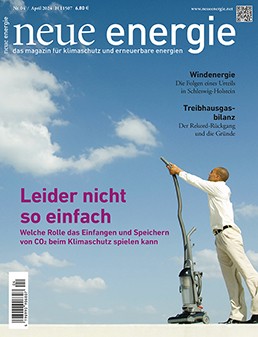Climate and industrial policy
“These dynamics are here to stay”

Fotos: privat
Mary Hellmich (Adelphi), Sarah Jackson (E3G)
Weiterführende Links
neue energie: Lately, the US Inflation Reduction Act, or IRA, has been a huge talking point in Europe. It basically offers billions of dollars in subsidies for technologies like electric cars and solar plants but asks for them to be at least partially produced in the United States. How important is this law for US climate policy?
Mary Hellmich: It is a huge deal. This is the most significant piece of US climate legislation, and it takes them within striking distance of fulfilling their Paris Agreement goals. With some other climate policies on top, it now looks like the US could achieve those targets, and it came so close to not being passed at all. So, we really can't overestimate how important this is for US climate policy and therefore international climate policy.
Sarah Jackson: On the international side it finally gives the US credibility that they are following through on their targets. They tried it in 2009 with carbon pricing, which didn't work. Democrats learned an important lesson from that experience, which is why the IRA is taking more of an industrial policy approach. It will definitely transform the US clean economy and one cannot emphasize enough how big of a deal it was and how close Democrats were to not getting it done. It really happened overnight, and it was a surprise to a lot of folks in D.C.
ne: Could you explain a bit more why the US chose to combine climate and industrial policy instead of pursuing other paths like regulation or carbon pricing?
Jackson: There are a couple of reasons, the first one being the tight majority in Congress. They had to do the so-called reconciliation process, which requires a simple majority but only allows for a bill trough taxing or spending. And given the experience with the cap-and-trade-bill that famously failed in the Senate a decade ago, Democrats opted for spending. The bill is also drafted around the idea to reduce dependencies from China. Having a stronger position on China is a bipartisan view in the US, it cuts across Democrats and Republicans. While the Inflation Reduction Act wasn't bipartisan, the way it was drafted in terms of China was a way to get more moderate Democrats on board. And then, the way you get climate policy done in the US is having the support of labor unions and workers. You can see that this is really sprinkled throughout the IRA, with a number of provisions like local content requirements and apprenticeship programs. There is this idea of invigorating American manufacturing, tying climate policy to jobs, bringing back to life communities that have been hollowed out by globalization.
Hellmich: The question of regulation is something that really contrasts the climate policy landscapes within the US and the European Union. If the US president issues an executive order to pass whatever kind of climate measure, when there is a change in power in the White House, the next president can just undo that. With the budget reconciliation, it’s embedded into the tax code. It’s difficult to overturn this, you would need the President and both chambers of Congress. And then people also like getting money. The states which will profit the most from the spending provisions in the IRA have Republican governors. And once that money starts flowing in, it would be very unpopular to take it away from the people there. So, it was a clever creation by Democrats. With any regulatory-based peace of climate legislation instead of reconciliation, Republicans could filibuster. Then it would need a supermajority of 60 out of a 100 in the Senate, and Democrats don’t have that. To even get all Democrats on board for a simple majority, they needed to pacify a lot of interests, which is why this is not just a climate bill, but also a labor and a health care bill. They had to mix all this together, otherwise it wouldn’t have passed.
ne: The IRA was passed in August last year, the first reactions in Europe were rather positive. Months later, turmoil followed because there is fear of becoming less competitive in climate technologies compared to the US. Why did the whole thing seemingly take the EU by surprise?
Jackson: That's a very good question, especially since the local content requirements were even in the previous proposal called Build Back Better, which was basically the precursor to the Inflation Reduction Act. But the EU was very surprised by the US bill and the US was very surprised by the strong reaction from the EU. It just seems like there wasn't enough diplomatic engagement between them when the bill was being drafted. There has definitely been progress since this whole blow-up has happened, with the EU-US taskforce on the IRA. European trade commissioner Dombrovskis is now in constant engagement with US Trade Representative Catherine Tai.
Hellmich: It was also being kept very tight-lipped. No one thought this was going to get passed until it did. But of course, there is still room for influence from other countries. That is what we heard especially with Germany, that there was not as much influence in the process as you would have expected. I think the shock with the IRA can also partially be explained by other factors, such as high energy prices in Europe. The IRA exposed some pre-existing fault lines within European climate policy. They realized that these problems are going to be exacerbated by this tempting offer to companies on the other side of the Atlantic.
ne: Last summer Europe was very much occupied with the war in Ukraine and the energy crisis, so maybe it was also a case of bad timing…
Jackson: Definitely. That's an interesting point, because a lot of folks in the EU were wondering, why is the US doing it now, when Europe is already suffering from an energy crisis. But the US position was, there is a small window for getting this passed, it had to be done before the August recess, it had to be done before the 2022 midterm elections. Because in the midterms, Democrats lost the House. So, this was the last chance, it is just unfortunate timing with all the other crises happening.
ne: As you mentioned, there are now multiple talks going on to find a way to somehow include European companies in the provisions of the IRA, although there is no free trade agreement between the US and the EU. Will the European worries be tempered in the end?
Hellmich: There were already signs to this after French president Macron's visit to the White House in December. An immediate result was that at least commercial vehicles from the EU won't have these domestic content requirements applied to them, which benefits a lot of European automotive manufacturers who lease cars in the US. It also looks like there will be some kind of broader inclusion of the EU within the IRA in a way that was not originally foreseen. But even if the EU could benefit a 100 percent from the IRA, they are now going to proceed with their own green deal industrial plan. It looks like the transatlantic trade tensions are at least significantly mitigated. But these dynamics are here to stay.
Jackson: I would add that the question is how US policymakers will respond to what the Biden administration is doing. Republicans can easily do oversight hearings saying that it is going too far in its interpretation to try and include EU producers. There have been reports that even Democrat senators are saying this. The text of the bill is very clear that the IRA is to benefit American producers and anyone that the US has a free trade agreement with, which does not include the EU. The Republicans might use this as a political wedge to foster division between the EU and the US and between Democrats in Congress and the administration. They could also sue, so this could get tied up in the courts.
ne: Switching to the European side, what do you think of the EU commission’s reaction, its plans to also ramp up clean-tech production capacities?
Hellmich: Something we heard from private companies in Europe about the IRA was: This is so easy and straightforward. People know exactly what to do to get this money. In the EU it is difficult to access this kind of funding, companies have people whose job is just to figure this out. A huge pillar of their Green Deal Industrial Plan is to simplify processes, but we'll have to see how this is implemented.
Jackson: It’s a huge opportunity, but there is still room to shape the Green Deal Industrial Plan and also the Critical Raw Materials Act. The money needs to be very targeted on decarbonization. If the EU is going to loosen state aid rules, you need to make sure that it is not just France and Germany who are benefitting, the countries with the deepest pockets. Companies from smaller, less wealthy countries also need to have an opportunity to benefit from the green transition. What we would like to see is an easing of state aid rules paired with new EU money, which is a very controversial topic in countries like Germany. They could also go further on industrial decarbonization in the steel sector, in the chemical sector. So, it’s a good start but the EU can definitely still improve on these acts.
ne: It somehow took the IRA to make the EU really work on this…
Jackson: Exactly, it caused the EU to do its homework and see what kind of benefits it was offering companies. But since then, it's been very fast, if you think about it. The EU is not usually known to move as quickly as it has.
Hellmich: It’s also not the first time that climate policies on both sides of the Atlantic are in conversation with one another. The European Green Deal is based on the Green New Deal in the US, at least by name.
ne: The content can be quite different, though. Europe for example tries to comply with international trade rules around the WTO, while the IRA does not. The US are commonly thought to be a leading advocate of free trade, but it seems like the EU has taken over this role. Would you agree?
Jackson: Absolutely. I think the EU are the ones holding up the WTO flag, holding the whole multilateral trade rule system together. In the US, the Democrats learned an important lesson from Trump and they are trying not to repeat mistakes they made in the past in terms of being perceived as the party that is not supporting workers. So, rejection of the WTO is bipartisan.
Hellmich: This is a huge point of divergence between the two. The EU has its Carbon Border Adjustment Mechanism, for which it is unclear whether the WTO will find it to be in line with international trade law. But the EU has explicitly stated that it should be WTO-compatible, so this is at least something they care about.
ne: Can the international trade system be made to work with what is needed for climate action?
Hellmich: We would certainly like to see a green overhaul of the international trade regime. Soon trade tensions around climate policy are going to become the norm and not the exception as countries embark on ambitious domestic mitigation and decarbonization. They need to protect themselves from economic dislocation and carbon leakage, which is not only bad for countries that are implementing ambitious policies but also on an international level. If companies just leave to produce somewhere else, that is not reducing global greenhouse gas levels, which is what matters.
ne: All in all, do you expect these developments to speed up international climate efforts, or to slow them down because of a heightened sense of economic competition, despite the diplomatic efforts you mentioned?
Hellmich: There is definitely potential for strong domestic industrial policies in the EU and the US to speed up climate action around the world. There could be partnerships with countries that don't have the same funding possibilities to build up their own industries. Other countries could be brought in to secure supply chains in a way that circumvents China, which is a huge priority for both the EU and the US, while ensuring that these countries that are rich in resources can also access low-emission technologies and processes. This could really put the world on a fast track to very ambitious climate action and fairly robust emissions reductions.
Jackson: Hopefully the EU and the US will take the approach to create local value chains and jobs in those countries, to view them really as partners and not just extract those critical minerals and take them out. It can't just be the wealthiest countries who are able to heavily subsidize that are embarking on this transition. There has to be an offer to other countries as well.
ne: Still, there seems to be a risk that with major economies increasingly competing to attract clean tech companies to their markets, poorer countries will be left behind. How can we make sure this doesn’t happen?
Jackson: This is the million-dollar question. I think all of us who work on international climate diplomacy are asking ourselves, what is the impact on poorer countries? We saw that when China heavily subsidized solar, the price went down, so there is an argument to be made that as the US and the EU spend more money on clean technologies, the prices will go down globally. But we really want to avoid a situation where there are countries left out of the transition, which is why partnerships are so important. One thing to remember is that the clean energy market is going to be a growing pie, there are going to be plenty of opportunities for countries to benefit from the transition. It now really depends on how the EU and the US handle this diplomatically with their outreach to other countries.
Mary Hellmich
is an Analyst at adelphi, a Germany-based think tank focusing on climate, environment, and development. She works on international climate policy and is co-lead of the Transatlantic Climate Bridge program office at adelphi.
Sarah Jackson
is a Policy Advisor for transatlantic diplomacy at international climate think tank E3G, another member of the Transatlantic Climate Bridge, which is an initiative supported by the German Federal government.
Aktuelles Magazin

Leider nicht so einfach: Welche Rolle das Einfangen und Speichern von CO2 beim Klimaschutz spielen kann
Bisherige Ausgaben »

Leider nicht so einfach: Welche Rolle das Einfangen und Speichern von CO2 beim Klimaschutz spielen kann
Advertorial
Anzeige
Termine
- 22.04.24 bis 26.04.24
Hannover Messe
- 23.04.24
21. Windmesse Symposium
- 24.04.24
Windbranchentag Schleswig-Holstein
- 22.04.24 bis 26.04.24
Hannover Messe
- 23.04.24
21. Windmesse Symposium
- 24.04.24
Windbranchentag Schleswig-Holstein



Kommentare (0)
Kommentar verfassen»Kommentar verfassen